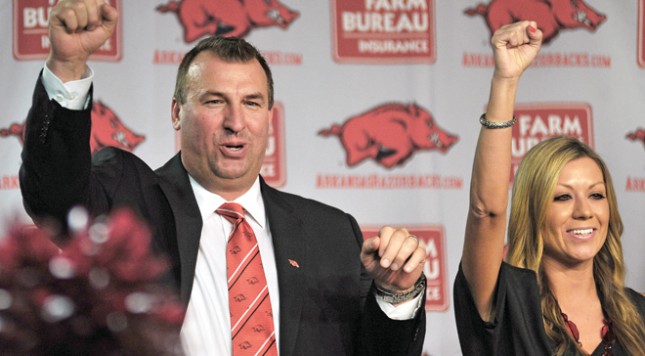Eighteen months ago, Arkansas needed a coach to stabilize a program that was flailing following Bobby Petrino’s ignominious exit and a year of John L. Smith’s, um, “caretaking.” Athletics director Jeff Long emerged from his search with Wisconsin coach Bret Bielema as his pick.
Under the terms of the six-year contract Bielema signed, Arkansas guaranteed it would pay its new coach $12.8 million if the schools opted to cut ties with him “at its convenience” (i.e., not for cause). Just by signing the deal, Bielema got about $13 million, which is equivalent to four years at his base rate of $3.2 million per year. (For the sake of comparison, he was making roughly $2.5 million per year at Wisconsin, and the Razorbacks apparently paid a shade under $2 million to buy out his contract there.)
For Long, hiring Bielema had to be seen as a major victory. The new head hog was coming off of multiple Big Ten titles and Rose Bowl berths. He followed in the footsteps of a Wisconsin legend, Barry Alvarez, and arguably elevated the program.
If you’re looking to generate some enthusiasm at a school that generally plays second fiddle to its conference mates, luring away a coach with that kind of resume will do it. That goes double if you’re facing some second-guessing for canning one of the best tacticians in the game.
Yet, even though the optics might work Long, what does that kind of guaranteed money say about Bielema’s relationship with Arkansas? Essentially, you’re counting on Bielema’s intrinsic drive to get the Razorbacks back to respectability. (And year one of the Bielema regime in Fayetteville didn’t go so well.)
Texas is facing an overhaul on a less dramatic scale under new coach Charlie Strong, who was a popular man earlier this week at Big 12 media days. Of course, ever since he was hired seven months ago, the big story with Strong has been what he’s not: Nick Saban. Rumors circulated late last year that the Longhorns were trying to pry the best coach in the game away from Alabama. Per Paul Finebaum, ESPN button-pusher extraordinaire, a cabal of bull-by-the-horn Longhorn boosters were offering $100 million to acquire Saban’s services.
Strong still made out pretty well, receiving a deal from UT with $25 million guaranteed.
That these lavish compensation packages are the norm in college football may have numbed us to the reality that they fly in the face of a basic assumption of human behavior. Namely, incentives matter.
The premium that schools might pay for a Nick Saban or a Bret Bielema gets them a brand name with an established track record. ADs buy a little trust from boosters. Fans buy more tickets.
What can’t be quantified, however, is how all that lucre impacts a coach’s motivation to succeed. Sure, you can offer relatively dinky sweeteners for meeting certain thresholds–making a bowl, graduation rates, etc. On balance, though, marginal rewards for performance tend to lose their oomph as income rises. That gets really skewed when you consider that a $50,000 bonus is equivalent to less than 2 percent of a $3 million salary.
It would be hard to imagine that Saban could be a more successful coach than he is now or that having more money at Texas would dull the edge that he brings to his job. On the other hand, we don’t really know how he would react to a compensation structure focused on performance-based incentives, either. Maybe he’d somehow find a way to motivate his teams to get up for “consolation games” if, say, he earned a million bucks for a Sugar Bowl win.
There’s no way that any star coach would agree to that kind of deal, especially in this environment. (Not to mention, it would reward cutthroat cheating and behind-the-scenes chicanery even more than now.) In practice, however, there’s an argument that the hiring process would be most efficient when schools focus on up-and-coming coaches who don’t have the leverage to demand rich contracts. Bring them in at more modest salaries with the opportunity to build their compensation over time.
In other words, the best move may be looking for the next Nick Saban, not trying to hire Saban himself.

